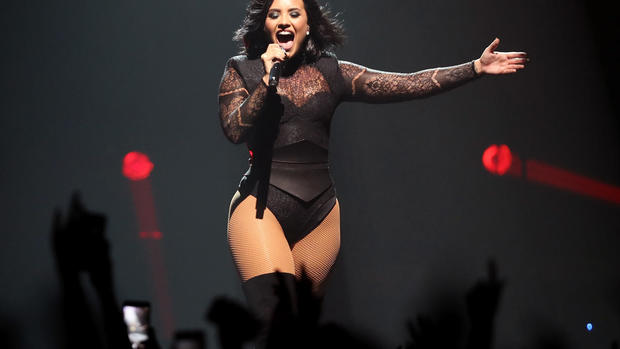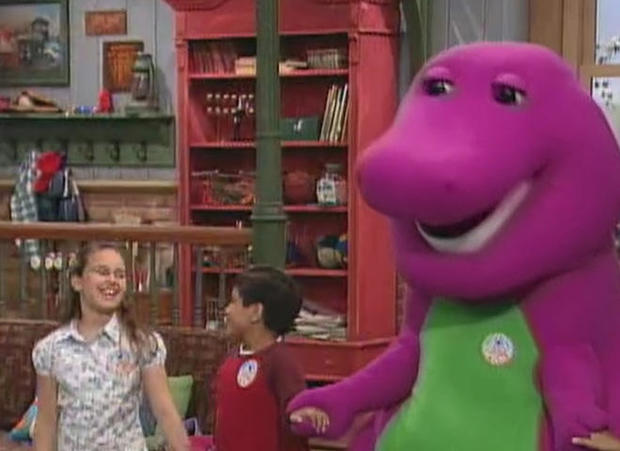Demi Lovato: Fighting back
Hit songs like “Give Your Heart a Break” have helped put Demi Lovato on the music map. She’s a successful young singer, but her path hasn’t always been easy. With Tracy Smith, we TAKE NOTE:
In a business where careers are sometimes measured in weeks, Demi Lovato is a seasoned veteran.
She made her first gold record in 2008. And now, at age 24, she’s had a stream of chart-topping hits, like 2015’s “Cool for the Summer”:
Smith recently met up with her and co-headliner Nick Jonas at the Washington, D.C., stop of their 44-city tour, as she headed for the stage.
Smith asked, “Do you have any mantras that you say?”
“No mantras, just a couple deep breaths and go out there and try to kill it,” Lovato replied.
Her onstage outfits are jaw-dropping. But this summer, she made a speech at the Democratic National Convention that was even more revealing. “Like millions of Americans I am living with mental illness,” she said. “I’m lucky; I had the resources and support to get treatment at a top facility.”
It was an extraordinary admission for a pop star to make, especially on national TV.
Lovato suffers from bipolar disorder, and wants to make it OK to talk about.
Smith said, “You’re very open about your struggles. Why?”
“At a young age, I realized that, if I’m going to become a singer, I need to use my voice for more than just singing,” she replied.
- Demi Lovato pushes Congress for mental health reform
- Demi Lovato speaks out on mental health issues
- Demi Lovato on how she got her confidence back
Lovato has spent a lifetime standing out from the crowd.
She was a working actress at age 10, co-starring with a purple dinosaur. Even then, she dreamed (and prayed) she’d one day get the chance to really sing.
“It sounds ridiculous, but like, I kind of made a pact with God,” she said. “I don’t even think you’re supposed to do that! But I was, like, I promised, ‘If You make me a singer, one day I’m going to use my voice for so much more than singing and I’m going to help people with it.”
“And you’ve held up your end of the bargain?”
“I held up my end of the bargain, I still do. And God held up his! He was like, ‘You don’t realize what you’re asking for, but here ya’ go!’”
The answer to that prayer: the lead role in a hit Disney Channel movie, “Camp Rock.” Within weeks, Lovato went from child actor to teen superstar.
She says the sudden fame did a number on her body and soul. Off-camera, she battled bulimia, depression, substance abuse, and at age 18 made the first of several trips to rehab.
She said she was not a model patient. “I don’t think there is such thing as a model patient in rehab, no. At one point while I was in treatment, I was continuing to use drugs and drink because I couldn’t function without it.”
The downward spiral continued until 2011 when, after an especially rough night, her therapist put her in touch with Mike Bayer, founder of the CAST Centers, an addiction treatment and wellness facility in Los Angeles.
Bayer told Smith that when he first met Lovato, she was “very closed off. Would sleep a lot. One-word answers. Didn’t really care about [anything].”
Bayer’s first move was to take everything away, including her freedom.
Lovato recalled Bayer saying, “’Hand over your phone, hand over your car keys, your driver’s license, your credit cards.’ And I had a curfew. I had somebody sleeping in the same room with me because I was so manipulative and sneaky that I could make anything happen wherever it needed to happen. So I had to give up all of that freedom in order for it to work.”
And it seems it has worked. She’s learned to deal with her issues -- sometimes by going to the gym and punching them out. The gym is called Unbreakable -- and apparently she is.
Smith said, “You know, you could do any exercise you want, like aerobics, zumba, any of that kind of stuff.”
“Yeah, but that’s not fun for me. This is fun for me. And also, I get to be one of the guys, too, you know? I spend a lot of time in hair and makeup, going a lot of girly stuff, but in here my inner dude comes out!”
And that inner dude has quite a kick.
“You look like a fighter to me,” Smith said.
“Thanks, thanks. I look like a sweaty pop star right now. That’s what I look like.”
The workouts help her cope with the physical demands of her tour.
She’s also bringing Mike Bayer and his staff to every city on the road, to give her fans a chance to see what successful treatment looks and sounds like.
Lovato has bought into the CAST program -- literally. She’s now a co-owner.
Phil McIntyre, her longtime manager, said, “How many 24-year-olds do you know that own their own treatment center, which is incredible? But then to leverage her position in pop music to do so much good is just incredible.”
Smith asked Lovato, “You could have invested in a lot of things. That you chose this, what do you think it says?”
“I’m not so concerned with what it says,” Lovato replied. “It just feels good.”
For Demi Lovato, there will likely be more platinum albums ahead, and more TV shows -- and even some “Carpool Karaoke”:
But she’s also four years sober, and to her, nothing else will ever be more important.
“Because of that, I’m now sitting here right now, alive, and more successful than I’ve ever been,” she said.
“That’s interesting that you use that phrase ‘sitting here alive,’” Smith said.
“Yeah, ‘cause that’s actually the most important part of that sentence. Like, yes, it’s cool that I’m successful, but the most successful thing that I’ve done has been able to beat my addiction and that I’m sitting alive in front of you today.”
For
more info:
- demilovato.com
- Follow Demi Lovato on Twitter (@ddlovato), Facebook, Instagram, Tumblr and YouTube
- CAST Centers, Los Angeles
- Unbreakable Performance, West
Hollywood, Calif.


